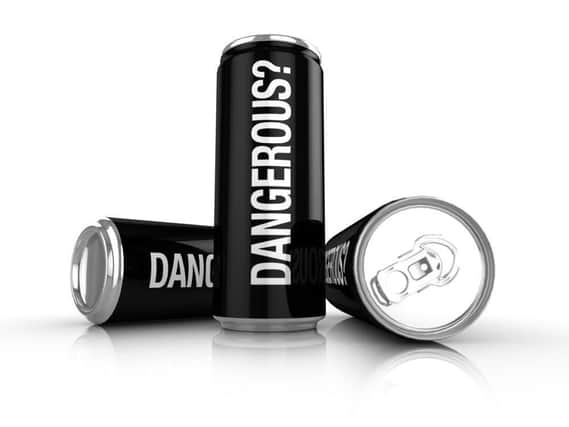Children should be banned from drinking energy drinks over dangers of mental health problems and kidney damage, say researchers


They also fuel risk seeking behaviour such as alcohol and drugs abuse, accidents, violence and antisocial behaviour - on top of rotting teeth, according to the study.
Governments should regulate sales and marketing towards children and teenagers, and set upper limits on amounts of caffeine they contain, to combat the growing public health issue, say researchers.
Advertisement
Hide AdAdvertisement
Hide AdThe report does not name specific products but popular brands include Red Bull, Monster and Lucozade.
Some can contain up to 100 mg caffeine in every fluid ounce - eight times more than a regular cup of coffee at 12mgs.
A moderate daily intake of caffeine up to 400 mg is recommended for adults, but little research exists on tolerable levels for youngsters.
Health problems
Nutritionist Dr Josiemer Mattei, of Harvard University in the US, said: "We summarise the consequences of energy drink consumption, which include heart, kidney, and dental problems, as well as risk-seeking behaviour and poor mental health.
Advertisement
Hide AdAdvertisement
Hide Ad"The evidence suggests they are harmful to health and should be limited through more stringent regulation by restricting their sales to children and adolescents, as well as setting an evidence based upper limit on the amount of caffeine."
Her findings follow a call by British scientists last year for the government to outlaw their sale and marketing to under 16s.
Dr Mattei's latest up to date analysis of current scientific knowledge found their advertised short term benefits are outweighed by serious health risks.
It said these include "risk-seeking behaviour, mental health problems, increased blood pressure, obesity and kidney damage."
Alcohol risks
Advertisement
Hide AdAdvertisement
Hide AdThe study, published in the journal Frontiers in Public Health, also highlighted the worrying trend of mixing energy drinks with alcohol.
Dr Mattei and her team of graduate researchers recommended restricted sales to children and adolescents - and setting evidence-based caffeine limits.
As energy drink consumption continues to grow worldwide, there is a need to thoroughly examine their advertised benefits, nutritional content and any negative effects on public health, they said.
Most contain similar ingredients - water, sugar, caffeine, certain vitamins, minerals and stimulants such as guarana, taurine and ginseng that have no nutritional benefit.
Advertisement
Hide AdAdvertisement
Hide AdThe health risks associated with energy drinks are mostly attributed to their high sugar and caffeine levels.
They range from risk seeking behaviour, such as substance misuse and aggression, mental health problems in the form of anxiety and stress, to increased blood pressure, obesity, kidney damage, fatigue, stomach aches and irritation.
Stimulants
Last year a survey led by Durham University, involving 16 European countries including the UK, found 68 per cent of 11 to 18-year-olds and almost one in five under 10s consume energy drinks. And 12 per cent of the younger group have downed at least a litre in a single session.
It found sales of energy drinks in the UK increased by 155% between 2006 and 2014, from 235 to 600 million litres.
Advertisement
Hide AdAdvertisement
Hide AdThe report said more research was needed on how the high levels of sugar and caffeine in energy drinks interact with each other and with other stimulants present such as taurine and guarana.
A single can of popular brands on the market can contain around 160mg of caffeine, while the European Food Safety Authority recommends an intake of no more than 105mg of caffeine per day for an average 11-year-old.
The report called for legislation banning the sale of energy drinks to under-16s and a ban on marketing targeted at children.
Nutritionists say the youngsters are raising their risk of obesity, type-2 diabetes, and tooth decay.